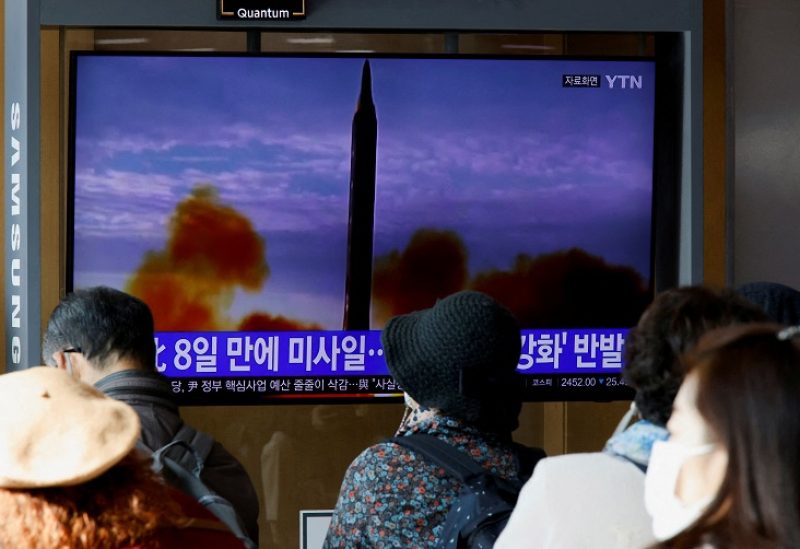
FILE PHOTO: People watch a TV broadcasting a news report, on North Korea firing a ballistic missile off its east coast, in Seoul, South Korea, November 17, 2022. REUTERS/Heo Ran/File Photo
According to the Japanese Coast Guard, North Korea launched an alleged intercontinental ballistic missile (ICBM) on Friday. The missile was most likely to have landed in the water about 210 kilometres (130 miles) west of Hokkaido,
Japan’s defense minister Yasukazu Hamada said that the missile had sufficient range to reach the United States mainland.
This is the hermit country’s second missile launch in as many days.
Seoul’s Joint Chiefs of Staff said it had “detected a presumed long-range ballistic missile around 10:15 am (1:15 am GMT) fired from the Sunan area in Pyongyang towards the East Sea.” This was a reference to the Sea of Japan.
According to the presidential office, the National Security Council of South Korea convened on Friday to discuss the alleged ICBM launch.
Japanese Prime Minister Fumio Kishida called the launch “absolutely unacceptable,” while adding that no damage to ships or aircraft have been reported.
Missile tests spark worry
The launch on Friday comes a day after North Korea started testing ballistic missiles. Pyongyang has warned it will carry out further such actions, sparking worries that a nuclear test may occur soon.
The ICBM is North Korea’s longest-range missile and is capable of delivering a nuclear payload to any point in the continental United States.
North Korea has conducted unprecedented number of ballistic missile teststhis year.
Pyongyang launched 23 missiles on November 2, surpassing its total for the full year of 2017.
These tests are prohibited by United Nations Security Council resolutions that has sanctioned the nation over its missile and nuclear weapons programs.
North Korea decries war drills
A day earlier, North Korea’s foreign minister, Choe Son Hui, criticized a trilateral meeting between the US, South Korea, and Japan, during which the leaders denounced Pyongyang’s missile tests and committed to stronger security cooperation.
Choe said their “war drills for aggression” were inviting a “more serious, realistic and inevitable threat” upon themselves.
“The keener the US is on the ‘bolstered offer of extended deterrence’ to its allies and the more they intensify provocative and bluffing military activities … the fiercer the DPRK’s military counteraction will be,” Choe said in a statement.
“The US will be well aware that it is gambling, for which it will certainly regret,” Choe added.
In response to the nuclear-armed North’s rising provocations, Washington has been working to strengthen regional security cooperation and increase joint military exercises. The North perceives all such actions as signs of US aggression.
North Korea’s latest missile launches were the topic of conversation between US President Joe Biden and his Chinese counterpart Xi Jinping earlier this week, as well as talks between Xi and Kishida.
Meanwhile, when Chinese and Japanese leaders met for the first time in three years on Thursday at the Asia-Pacific Economic Cooperation (APEC) meeting in Bangkok, North Korea again topped the agenda.